

| Sean McMullen has his own Web page. | ||
| Click on a book's image or title to order from Amazon.com |
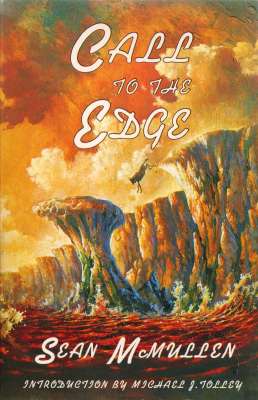
Call to the Edge
Aphelion (Australia), TPB, © 1992, 245 pp, ISBN #1-875346-06-6Reviewed February 2005
Call to the Edge is a collection of McMullen's early short science fiction, including the stories on which his first two novels are based. It provides insight into how good a writer he was off the bat.
"The Colours of the Masters" (1988) is a charming tale of an early 19th century invention of a way to record - as visual signals - music of the era, and the discovery of the saved recordings a century and a half later. Although modest in scope, McMullen effectively makes the reader realize what a great discovery such a thing would be.
"The Eyes of the Green Lancer" and "Destroyer of Illusions" both feature stories which would be incorporated into Souls in the Great Machine. "Eyes" is about the risks people must take in staking a claim to a particular fantastic frontier. "Destroyer" portrays a unique individual given - temporarily - a unique sort of power and the good and the bad she does with it. "Eyes" if an effective story on its own, while "Destroyer" feels only half-finished and is far more effective as part of a longer work.
"Alone in his Chariot" is a twist on drug addiction, and although the basic idea is clever I thought it was the low point of the collection. Most drug addiction stories seem to have similar - and similarly-shallow - themes of loss of control and retreat from the world, and "Chariot" is not really much different. It's also a rare story in which McMullen doesn't carry off his trademark sense of emotional exultance; it's just a nasty little drug drama.
"The Deciad" and "Pax Romana" are opposite sides of the idea which forms the novel The Centurion's Empire. "The Deciad" concerns a group of people who have invented long-term human hibernation and have been guiding the Roman Empire. At the Empire's fall, they seek an ultimate escape in both space and time to start the cycle anew. "Pax Romana" is about a Roman warrior in Britain who came into possession of a similar secret and wakes in the Dark Ages and helps a local noble bring peace to his countryside. "Pax" is by far the more effective of the pair, as the characters are vividly drawn and there's a terrific catharsis at the story's climax. "The Deciad" is more of an ancient epic with a bit of cautionary tale thrown in. It has a clever twist at the end which was excised from the novel.
"While the Gate is Open" is about a scientist who chances upon a way to see past the veil of death for a short time, and the compromises in her life that this forces on him. I found it largely unsatisfactory, never really delivering the big payoff and instead being a relatively mundane suspense tale. The ending is moderately clever.
"The Devils of Langenhagen" is a World War II story from the point of view of a beleaguered German air base, and a couple of terrific planes which visit and support the base in the waning days of the war. It turns from adventure story to philosophical drama towards the end and delivers some provocative ideas to chew on. It's effective in its simplicity and brevity.
Finally, "The Dominant Style" concerns a visitor from far away who comes to what looks like late-1930s Australia and meets a charming couple whom he stays with. Neither visitor nor hosts - nor indeed the land - are what they truly seem, and it also delivers an interesting moral quandary, this time about the lengths we might go to to save the human race in the future. It's a classic example of looking at the good of the many from the point of view of a few individuals.
Call to the Edge is surely difficult to come by these days - I lucked into a used copy a few years ago - but if you happen across it, pick it up, especially if you're already a fan of McMullen's work.
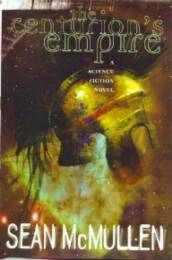
The Centurion's Empire
Tor, HC, © 1998, 383 pp, ISBN #0-312-85131-6Reviewed April 2002
I read McMullen's first (US) novel having already read his next three, Souls in the Great Machine and its two sequels, so McMullen's work isn't new to me. Happily, this novel still displayed McMullen's strengths while being an intrinsically different story.
In the first century a.d., a group of scientists, politicians and other great thinkers secretly control the destiny of the Roman Empire. This is because they have a formula which allows them to sleep for decades and centuries in deep freeze, allowing their organization to retain a global view of the world that no one else does. Unfortunately, a clever raid on their fortress results in the loss of this secret, marking (eventually) the end of the Temporians' rule (and, not coincidentally, the ultimate fall of Rome).
Vitellan, however, is a young Centurian in the Roman army, who was to be seconded to the Temporians when the raid occurred due to his high resistance to cold. He ends up being sent to England, where he happens to meet the fellow who eventually comes to own the Temporians' secret. After some experimentation, Vitellan goes to sleep, eventually to take up in the 9th century.
Vitellan proves to be a master at learning new languages and adapting to new cultures. His knowledge of combat and strategy helps Alfred the Great unify the region, although Vitellan eventually elected to go back to sleep, to awake again in the 14th century. There he has adventures in the chaos of France during the Hundred Years' War, en route to a new place of slumber in Switzerland. Vitellan's English village of Durvas has built a small culture around the frozen Centurian, and the current Icekeeper has constructed a scheme where Vitellan can be safely frozen for centuries without relying on the potentially faulty Durvas traditions. Unfortunately, en route, something goes wrong, another man ends up taking Vitellan's place, and Vitellan goes to sleep in a different location.
Having hoped to sleep until 2056, when he'd be 2000 years old, Vitellan is surprised to wake up in 2028, having been captured by a group opposed to the corporation that Durvas has become, and disoriented by the extreme technological shifts that have occurred since the 14th century. Vitellan quickly finds himself on the run, with no one to trust, and carrying a secret about ancient Rome that no one else can guess.
The Centurion's Empire works with some old SF themes - man out of time, man experiencing culture shock, man on the run from forces he barely understands - but handles them with unusual grace. Vitellan's skills and intellect are evident every step of the way, and despite being somewhat cold (pun intended), he's an agreeable protagonist.
The story strikes an unusual balance between being a futuristic adventure yarn and being a subtle mystery. Everyone in the 21st century has something to hide, although a few prove more admirable than others, and for unusual reasons. Alert readers will pick up on some of the mysteries quickly, though McMullen does a good job of obfuscating some of them.
I think I enjoyed the first half of the book - occurring in the first three time periods - better than the second half, as the settings felt almost more exotic than the high tech of 2028, and Vitellan's presence there made them feel more real. Vitellan eventually masters the future world, as well, but the conclusion doesn't feel wholly satisfying; I wanted a little more than the final note the book sounded.
In some ways, this feels like a first novel: The dialogue isn't nearly as snappy as in McMullen's later books, and the plot and characters are more straightforward. This isn't really to the book's detriment, though; it's just that if you enjoyed this one, you should enjoy his later work even more, as he consolidates his writing skills. Centurion is still an entirely worthwhile read.
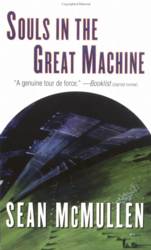
Souls in the Great Machine
Tor, HC, © 1999, 448 pp, ISBN #0-321-87055-8Reviewed October 2000
Souls in the Great Machine can count among its ancestors stories like H. Beam Piper's Lord Kalvan of Otherwhen, and the Steampunk subgenre. In other words, it focuses on low-tech implementations of high-tech concepts, and how they change the world around them.
2000 years in the future, the world has been ravaged by The Call, a mysterious compulsion which sweeps across continents, forcing all mammals larger than a medium-sized dog to walk towards the ocean, never to be seen again. In addition to this, electric-based technology simply does not work in this future world, and steam-powered technology is religiously proscribed. Therefore, most technology is mechanical (often based on mechanical clocks), and battles are fought with muskets, flintlocks, and swords. Walls are strategically placed to catch people when the Call passes over an area, and many people wear Call Anchors which release after a period of time to keep them from walking away if in the open.
The novel takes place in Australia, where Zarvora Cymbeline, Highliber of the library of Libris in the city of Rochester, has learned through a telescope that machines on the moon are ready to carry out their two-thousand-year-old programming to blot out the sun, returning the stifling cold of Greatwinter to the world. She resolves to stop them, and to do so she creates the Calculor, a large processing machine whose individual mathematical components are human beings: Felons serving out their terms, and men and women forcibly abducted to serve.
Lemorel Milderellen travels to Libris and quickly rises in the ranks of the Dragon Librarians there, overseeing elements of the Calculor. She falls in love with chemistry student John Glasken, but soon learns that he is a rake, and upon finding that he is sleeping with many different women she uses her authority in Libris to sentence him to service in the Calculor, with orders that unlike the other components, he is to be denied all access to sex.
These three individuals are the main characters of Souls: Zarvora seeks to expand her power base until she has the resources to make a desperate strike against the entities in the sky. She drives the developing technology of the Alliance which she leads. Lemorel falls in love with another component in the Calculor, and embarks on a quest to find and win him when he disappears from its service, eventually becoming a great enemy of Zarvora. Glasken seeks to escape the Calculor and the figurative bondage of the women who maintain control over him, although his efforts are often thwarted.
Souls is a complicated book, whose themes focus on desire, manipulation of others, the acquisition of power, and redemption. Glasken's sins are at first the most blatant, but in many ways are the least harmful to others, although he pays for them greatly and repeatedly. Most of McMullen's main characters - even beyond the prime three - are women whom Glasken encounters in various ways, and most of whom torture him sexually - appropriate in a sense since his lust is often touted as among the strongest these women have ever encountered, although their machinations eventually become outright cruel. Glasken's eventual redemption is one of the most explored and successful elements of the book.
Zarvora's quest, of course, is to save the world, and she goes to great lengths to achieve her ends, enslaving thousands of people, and killing many others. Whether her fate is what she deserves is a considerably more complicated question, and she, too, undergoes some changes in the course of the novel.
Lemorel's story is stranger and less successful. Her drive and her quest are less well-defined. And, there's a five-year gap in the middle of the book when many changes occur without actually being shown to us. Glasken's evolution is eventually filled in adequately, but Lemorel undergoes a radical metamorphosis with scant explanation, which renders the second half of the book slightly unbelievable since her motivations are largely unclear. In many ways she travels the opposite path from Glasken, but it's not revealed why.
To his credit, McMullen doesn't shy away from treating his characters as brutally as would be realistic in a world where duelling is common, medical technology is primitive, and wars are bloody. He also comes up with entirely satisfying explanations for much of the strangeness going on in the world, and although the tone of the novel often seems like 19th century England crossed with the age of chivalry, it is ultimately a satisfying science fiction work. I wish he had gone into the workings of the Calculor a little more; its computing power is entirely reasonable, but some of its capabilities beyond mere computing are left as vague plot devices.
Souls is a masterful piece of world-building, and an artful juggling of a disparate and large cast of characters. It's also a rare novel in that it uses sex as a major theme while rarely doing so gratuitously. It is, however, a novel which is dark and violent (both physically and emotionally), which at times makes the going rough (because it's exhausting!). But it does reward the effort.
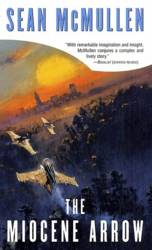
The Miocene Arrow
Tor, HC, © 2000, 416 pp, ISBN #0-312-87054-XReviewed December 2000
The sequel to Souls in the Great Machine is even better than its predecessor. Although it's not as high on ideas content, the writing is fundamentally better and it contains a powerfully star-crossed love affair between two of the principals.
Two thousand years in the future, North America is also affected by the Call, periodic clouds of compulsion that make all mammals larger than a small dog want to walk mindlessly to the seashore and into the ocean. Unlike Australica, North America is mostly covered by a permanent blanket of Call, except for three "Callhavens" where the Call only comes through once every few days. The story takes place in Mounthaven, running roughly from Missouri west to the Rocky Mountains (as with Souls, one wishes a map of the continent of the era were provided), which is carved up into several smaller dominions. Natural resources being at a premium, the ruling class of the nations - the Wardens - fight wars using ritual battles in their gas-powered flying machines. Society is highly stratified, and the battle satellites in the sky have limited the size and speed of both ground- and aircraft, which additionally limits the scope of any warfare even if tradition did not.
Into Mounthaven come a cadre of Avian infiltrators from Australica, people who can defy the call and provoke a war between Greater Bartolica and the nation of Yarron for their own ends. They also provoke the Bartolican Airlord to revive the concept of total war, causing full-scale ground invasions of Yarron. Only the insight and leadership of Warden Sartov of Yarron keeps Bartolica from quickly conquering and assimilating Yarron.
Meanwhile, several other Aviads - including the main characters of Souls in the Great Machine - have arrived in Mounthaven and provide information to Sartov which allows him to improve the technology of Yarron's air force. As a result, young fliers Serjon Feydamor and Bronlar Jannian achieve great renown as the deadliest fliers of their generation - a peculiar situation for Bronlar, who is Yarron's first notable female flier.
At its grandest, The Miocene Arrow is the story of how central tenets of Mounthaven civilization are disrupted by the intrusion by the Aviads, the introduction of total war, the improvement of battle technology, and the breakdown of the class system. When Yarron is fighting for its survival, the preservation of chivalric tradition is of secondary import, which in a sense gives them a crucial advantage over Bartolica.
In a way, The Miocene Arrow is what the film Star Wars: The Phantom Menace should have been. After all, both of them involve hierarchical cultures where the peace is kept through the ritual behaviors of an elite class of warriors, but forces working from within the ruling system cause that system to start to crumble, causing the familiar way of life to give way to a new structure. But The Miocene Arrow is more successful because it deals with the sweeping changes brought on by these actions, focuses on characters whose actions and motivations make sense, and crafts believable characters we care about whose lives are deeply affected by these changes. (To be fair, The Phantom Menace is the first part of a trilogy, but it gives little indication that it will carry any of these payoffs.)
The evolution of Serjon and Bronlar's status within Yarron and relationship towards each other is the emotional center of the novel, especially when an ambitious bombing mission into Bartolica results in Serjon being shot down by one of his own wingmen, and he's uncertain whether Bronlar is responsible. This results in a heart-wrenching dispute between the two heroes of the Yarron side, further stoked by the agendas and behavior of the people around them. It makes the last hundred pages of the book a real page-turner, as it's not clear how McMullen's going to resolve the issue.
The characters from Souls who appear in this novel don't fare very well through the story, although this mostly works out fine, except for the rather disappointing fate of rake John Glasken, who is given the short shrift - unfortunately, since he's a lively and enjoyable character.
McMullen's plotting is stronger here than in Souls, and his turn of phrase is as sharp and often witty as ever ("That is not the most noble of occupations." "Ah, but I am not the most noble of men."). Overall, it's a noticibly better-written book than its predecessor, the characters are more sympathetic (it was sometimes hard to really root for any character in Souls), and the turning points scenes are often more dramatic.
The book's title refers to the origin of the Call (several background details of this future world are explained in this book) and the plans of the Aviads provoking the war, although this plot element proves to be one of the less interesting ones. Its resolution opens up the milieu to some new changes, presumably to be explored in the next book. Of course, it seems likely that there will be some diminishing returns in continuing the series until and unless McMullen introduces some new science fictional ideas to drive the story.
But regardless of any future sequels, this is an outstanding book which deserves to be read.
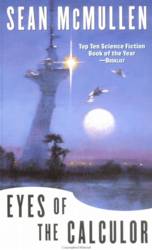
Eyes of the Calculor
Tor, HC, © 2001, 589 pp, ISBN #0-312-87736-6Reviewed January 2002
Eyes of the Calculor is apparently the conclusion to McMullen's "Greatwinter" series, making it a trilogy. Unfortunately, the conclusion is both not as compelling as its predecessors, and a bit of a letdown in the context of the three-volume narrative as a whole.
Almost simultaneously with the conclusion to The Miocene Arrow, Mirrorsun - the orbiting band about the Earth, placed there millennia ago before civilization's collapse to forestall global warming, and controlled by an artificial intelligence - lets loose an electronic pulse, which fries all electronic equipment on the planet. This includes the long-range "sunwing" aircraft used by the Avians, and the electronic computers ("calculors") used in Libris, the center of learning and power on the Australican continent. Suddenly, the world is faced not just with the end of the Call - opening vast tracts of land to human habitation and threatening the security of Avian settlements therein to attack from bigoted humans - but with a world without the new electronic inventions of the last 20 years.
The direct results of these events are severalfold: In Mounthaven, America, the rulers of the combined territory are faced with both a large frontier to conquer, and the possibility of being overrun by the more populous Mexhaven to the south. They decide to use their gas-powered aircraft to stage a mission to Australica to buy horses, which are unknown in North America at this time. This effort is led by a hero of the recent Mounthaven war, Semme Samondel Leover, and supported by two other heroes, Sair Serjon Feydamoor and Semme Bronlar Jannian.
Second, Franzas Dramoren, current Highliber of Libris, immediately being back the pre-electric technology which had raised the Rochestrian Commonwealth to prominence in Australica, including the human-conscript-powered Calculor.
Third, Jemli Milderellen assassinates her husband to become Overmayor of the western states in Australica and becomes a religious prophet, condemning all electric and gas powered devices, and attempting to overthrow the other mayorates through religious fervor in the wake of the Mirrorsun debacle.
One last piece is thrown into the mix: A couple of young women are raped and left for dead in Australica. One dies, and her brother Martyne Camderine escapes from his monastery - which studies deadly combat skills - to avenger her death. The other goes insane, but is revived when a band sent down from Mirrorsun years earlier is placed around her neck. She's not the same person, however, but is an efficient and ruthless killing machine due to having the personality and memories of a character from the previous books who had been stores inside Mirrorsun. And this person is not too happy about being in the body of Velesti Disore, but nonetheless joins Libris and becomes a well-regarded Dragon Librarian, as well as being a friend and pupil of Martyne, who himself joins Libris' Espionage Police.
All of this comes to a head when Samondel's mission to Rochester leaves her shot down and a fugitive in hiding, where she meets Martyne and falls in love with him. This is further complicated by secret conspiracies involving Mounthaven, the Avian sanctuary on Tasmania island, and Mirrorsun.
The essential problem with Eyes of the Calculor is that it's not as focused as the earlier books. Each of the previous books dealt with a single, essential issue which the characters were working towards (or against), and the supporting plot threads - however intriguing - were nonetheless in support of this issue. Where is Eyes' true focus? On the plight of the Avians? On Jemli's religious crusade? On Velesti's peculiar predicament? On Martyne and Samondel? None of these is sufficiently rendered (or, perhaps, sufficiently interesting) to carry the story on its own, and all together they tend to diffuse the novel rather than exhibit synergy. I think the novel ultimately decides it's about Martyne and Samondel, with the dramatic focus being on the Avians' situation, which is entertaining, but which feels less earth-shattering than the other two novels, particularly since the Avians aren't really the true character focus, nor does much of the story occur on Tasmania.
In a way, I wish McMullen had chosen to tell a different story: The story of Mounthaven dealing with incursions from Mexhaven, trying to adapt its society to handle the changing conditions, and perhaps embarking on an expedition to Australica I think would have been more dramatic and satisfying. Australica's problems seem less compelling by contrast, perhaps because Australica has the advantage of being a (very big) island.
The fact that several characters from earlier novels are presented in a radically different light is also rather jarring. While their motives are cogently explained, I didn't feel their urgency. Their motives felt like they were shoved aside in favor of the main characters here, which didn't seem right in the context of a trilogy. It seemed like those characters deserved either better fates, or more time to really work through what they were grappling with.
Also, I think the final words of my review of The Miocene Arrow were correct: Having not really introduced any new science fictional ideas into the story, it feels like Eyes is to some extent flogging a dead horse. We've seen this technology before, and what we see here seems barely to be variations on a theme.
On the plus side, McMullen's essential strengths are intact here: His characterizations are quite good, and his ear for dialogue is among the best in the genre. There are some truly priceless exchanges between the characters (particularly among Martyne/Velesti/Samondel), and there's a lot to laugh about despite the gravity of some of the situations. His juggling of the various plot lines he throws out there is excellent and generally easy to follow (for all that I wish he'd chosen different plot lines), and he even has a couple of clever surprises along the way, one of which I guessed just barely before it was revealed.
(And by the way, I'm pretty sure that the title refers to Velesti, whose contact with Mirrorsun makes her effectively its "eyes" among humans.)
Ultimately, though, I felt this was a bit of a letdown after its predecessors. Fans of the first two books should enjoy it, but it felt like it could have been a lot more than it was. Ah, well!
hits since 8 October 2000.